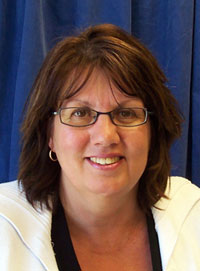UBC Okanagan study explores what happens when a desired home death does not occur
Lorrianne Topf, a UBC Okanagan Master of Science in Nursing student, is looking for family members of people with cancer willing to share their experiences when a desired home death for their loved one did not occur and happened instead in either a hospice or the acute care hospital.
Currently on leave from her position as Palliative Care Coordinator for the North Okanagan, Topf received a Psychosocial Oncology Research Training (PORT) fellowship in March to support her thesis research project, When a desired home death does not occur: family caregiver experiences.
“In my position as the Palliative Care Coordinator, I became aware of the challenges family caregivers face when they care for their ill family member in the home with the intent to support a home death,” says Topf.
“Circumstances would come about which prevented this from happening. Although, often times, the transfer of their loved one to the hospital or hospice house proved to be a positive move, there were other times when caregivers expressed concern and regret that they were unable to keep their family member at home.”
As Topf met with more families, she found many caregivers were unaware of the various supports that may have been available to them to help in supporting a home death or in the transition from home to hospice/hospital.
“We want to know what could be done differently to help ease the transition,” she says. “This study focuses on extending understanding of caregiver experiences when desired deaths at home do not occur, and the effect that this may have on their well-being. The hope is that the findings will bring forth recommendations and provide direction to health care providers in providing effective support to family caregivers in a manner that is meaningful to them.”
Topf says it has been a challenge finding family caregivers who meet the requirements of the research. “People definitely want to talk about their experiences,” she notes, “but the majority of those who have called have not met the parameters of the study.”
For caregivers to participate in the study, they must be 19 years of age or older, have cared in the home for a family member or close friend who had cancer, either the caregiver or the family member or close friend wanted to support a home death, and the family member or close friend died away from home either in hospice or hospital.
To participate in the study, contact Lorrianne Topf at 250-807-8627 or by email at topfl@interchange.ubc.ca.
In addition to the PORT fellowship this spring, Topf received the Bryce Carnine Memorial Prize this year, which is a UBC Okanagan endowment given to an undergraduate or graduate student in the Faculty of Health and Social Development who has conducted a research project or special initiative related to the prevention or cure of cancer or improving quality of life for cancer patients. Topf has also received a national award from the Canadian Association of Nurses in Oncology to support a novice researcher in cancer research.
— 30 —
